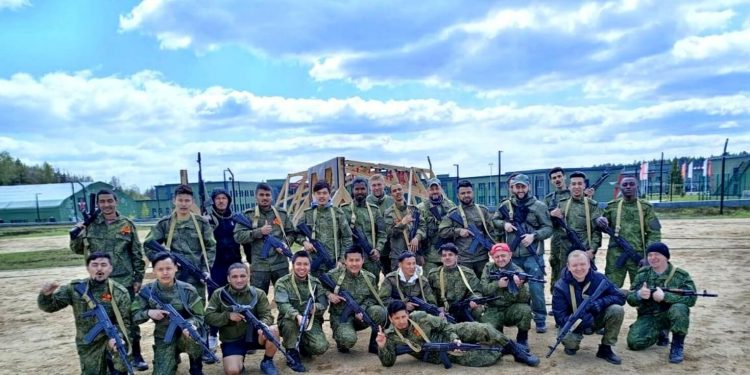Nepali citizens are reportedly joining the Russian Private Military Company (PMC) Wagner Group as mercenaries, likely influenced by limited job opportunities in Nepal and a new recruitment policy in India. Some of the recruits are even retired personnel from the Nepal Army. The allure of Russian citizenship, offered by President Vladimir Putin to foreign fighters, has captured their attention. The Nepali government is taken aback by the situation, lacking any bilateral agreements with Russia, and the Nepal Embassy in Moscow asserts that these individuals are acting in their “personal” capacity.
Over a dozen Nepali youths are currently undergoing training in weapons handling and combat as part of their engagement with the Russian Army. This development follows President Putin’s decree on May 16, 2023, which simplified the process of obtaining Russian citizenship for foreign nationals who join the army for a year-long contract in what the Kremlin terms a “special military operation.” Given Nepal’s unemployment rate of 11.12 percent, the offer of fast-tracked citizenship is hard for Nepali youngsters to resist.
Russia’s offer includes simplified citizenship not only for the mercenaries but also for their family members. The situation has raised concerns, with strategic analyst Major General Binoj Basnyat (retired) emphasizing that if Nepali citizens are part of the military forces of a sovereign nation, it should align with the government’s foreign policy or involve a memorandum of understanding or treaty. However, in this case, no such instruments are in place, and the Nepal government needs to address the matter promptly.
Numerous videos have emerged on social media platforms, showcasing Nepali youths joining the Russian Army. Some videos depict their training, while others capture their journey to the training location. One Nepali youth, who had been studying at a Russian state university, faced the choice between returning to Nepal and facing unemployment or joining the Russian Army. The easier process of entering Russia compared to Europe, coupled with the prospect of learning modern weaponry and obtaining citizenship after a year, motivates these individuals to pursue this path.
Previously, there were reports of Nepali citizens joining the French Legion, but Russia offers a more accessible route. The Wagner Group has waived the requirement of knowing the Russian language, accepting English proficiency instead. The frustration of Nepali youth is evident, with a significant number seeking employment opportunities abroad due to the inability of Nepal to absorb them into the workforce. The International Labour Organisation reports a high unemployment rate of 19.2 percent among Nepali youth aged 15-29.
The Indian Army’s Agnipath scheme has also impacted Nepali youth’s prospects. The decision of the Communist government in Nepal to disallow the recruitment of Gorkhas into the Indian Army has led to a shift in their choices. The Indian Army’s higher pay, pension, and the option to settle in India made it an attractive opportunity. However, the new Agnipath scheme, which offers a four-year service without pension, has created uncertainties and strained relations between India and Nepal. Major General Basnyat highlights that the scheme was not part of the tripartite agreement between India, Nepal, and the UK, and it has contributed to increased unemployment and potential security concerns.
As Nepal and India address their political differences, Nepali youth caught between unemployment and conflict are choosing to take risks in pursuit of better lives. The lack of government oversight and regulation in these circumstances raises concerns about potential consequences and the urgent need for the Nepal government to address the situation.

